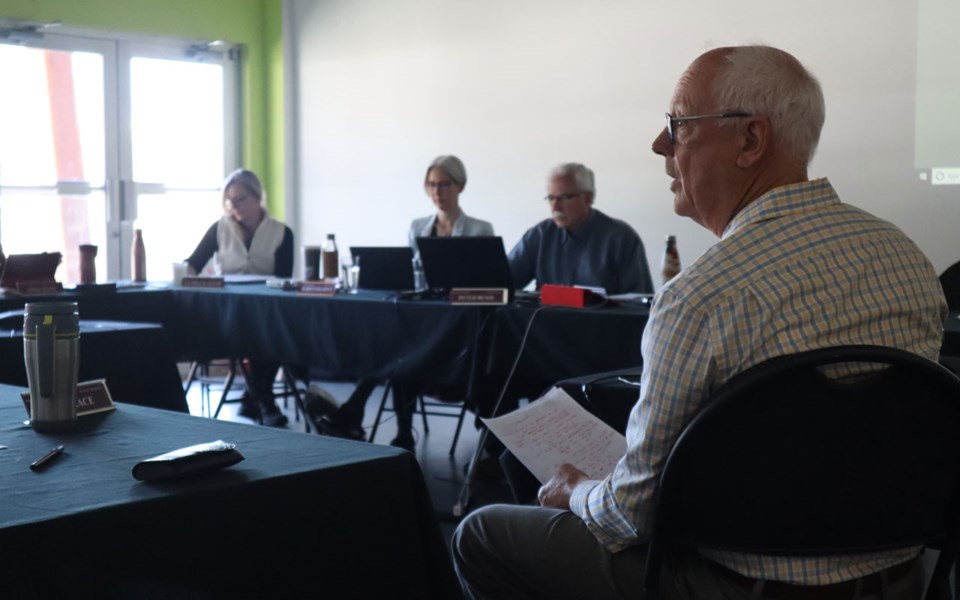A proposal for affordable employee housing at WedgeWoods estates north of Whistler was rejected at first reading by the board of the Squamish-Lillooet Regional District (SLRD) on Aug. 26, prompting frustration and confusion from supporters.
“I have no words. I am so … angry,” said Matt Woods, president and director of Coastal Mountain Excavations, which did the servicing work for the development.
“I am losing guys daily to housing, and [the SLRD] can’t get their heads out of their ass and approve what’s needed. I could fill the place with my staff tomorrow.”
The rezoning application would add 36 covenanted, non-market, for-purchase townhomes and 16 covenanted rental units, as well as 12 new bare land strata lots to the development.
As part of the deal, proponents Yukon Inc. also planned to donate 120 hectares of land on the west side of Highway 99.
The 36 three-bedroom townhouses would be offered at an initial sale price of $315 per square foot, with estimated sale prices in the $450,000 to $530,000 range.
In voting against the proposal, SLRD directors Jack Crompton, Jen Ford, Mike Richman, Doug Race, Chris Pettingill and Vivian Birch-Jones expressed concerns about increased traffic, the distance from services, the administrative burden of managing resale and rental, and a perceived inconsistency with the SLRD’s Regional Growth Strategy.
“I am not so much opposed to the 12 market lots … The location of the amenity is what I find troubling,” Crompton said at the Aug. 26 meeting.
“We need affordable housing and we are going to push as hard as we possibly can for it. We’ll continue to build it. I think it is important that it is in locations where people can access services without getting in a vehicle.”
But in the view of longtime developer Tim Regan of Vision Pacific (who has no connection to the proposal), the affordability issue in the Sea to Sky should have the SLRD taking a closer look.
There are about 45 lots left to be developed in Whistler, many of which will be expensive to bring online, Regan said.
“So it’s going to be cheaper for people to buy existing stock, which is basically rental stock at this stage, and they’re going to tear that stock down—I myself will likely be tearing down two to three places come the spring,” Regan said, adding that at $315 per square foot, the developer would be taking on much of the risk at WedgeWoods.
“I think if we were to create that product in Whistler, we’d be hard-pressed … In today’s construction environment, that is very attractive math,” he said.
“We have a massive backlog of housing required, and these guys could turn this around quickly. So my point is [that] for what they are offering, the risk they are taking, I think we have to be very sober about saying no to it.”
SLRD directors Barb Wiebe, Sal DeMare, Russell Mack and chair Tony Rainbow voted in favour of the proposal.
Hearing the other directors talk about traffic concerns in relation to the new housing is comical, Mack said at the meeting, noting that the highway is already packed most days and another 40 or 50 cars would have a minimal impact.
“I think the car thing is kind of an overblown situation. You’ve got your own problems you should look after before you start blaming another development on that,” Mack said, adding that the proposed parkland donation, which includes the popular “Kill me, Thrill me” trail, is attractive, too.
Proponent David Earhardt said he had more than 30 letters of support for the project, all from families and long-time locals looking to secure long-term affordable housing—a fact that only makes the rejection all the more frustrating.
“How do we as a community support those people that are so integral? We’re not talking about housing for lifties, or for somebody that’s in for a year, we’re talking about the nurses and we’re talking about the people who own businesses,” Earhardt said.
While the rezoning application has taken two years and cost hundreds of thousands of dollars, WedgeWoods is not dependent on it going ahead, Earhardt said.
“[WedgeWoods] is going ahead, we’re grateful for it, people are moving into the community and whatnot, so nothing is being made or broke based on this moving ahead,” he said.
“But we really thought it was something good for the community as a whole.”
For Woods, who pays $9,000 a month to rent housing for his staff in Whistler, and pays out of pocket for others to travel from Squamish and Pemberton, the current situation just isn’t sustainable.
“And we actually pay a living wage in this town. Our average hourly rates are probably getting close to $30 an hour,” he said, noting that at 75 staff on payroll, CME is not a small show.
“If we disappear, half of the snow removal capabilities in Whistler are gone,” he said.
“I’m just … frustrated. There are perfectly reasonable opportunities, and people willing to do the work and spend the money to make it happen, just to get … thrown in the ditch.”
The proposal isn’t completely dead yet—with the split vote, either the board chair or a director who voted in the majority can initiate a reconsideration at the next SLRD board meeting.
“The only solution that I can see is that if the public is concerned with it, they need to be vocal about it, or make it known,” Earhardt said.




